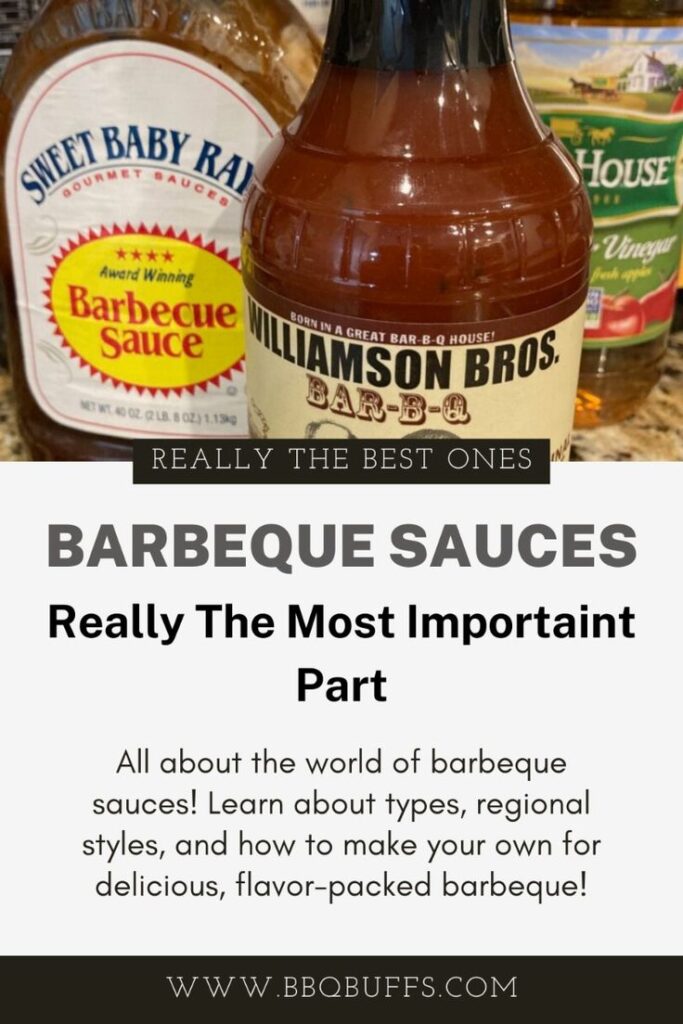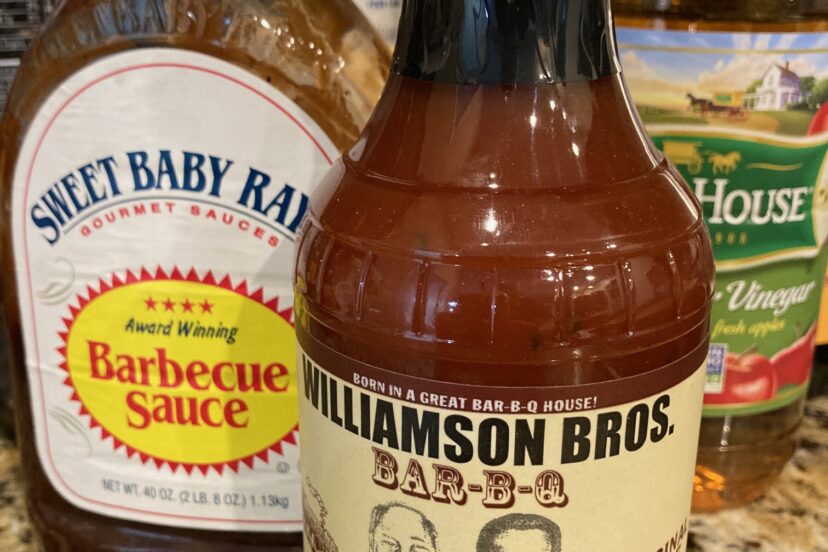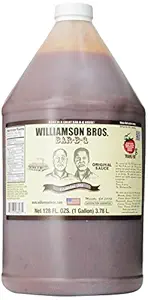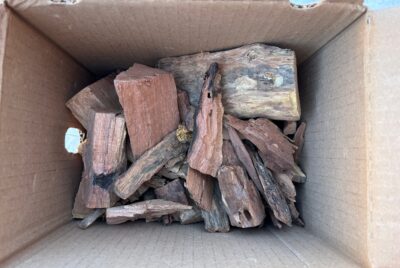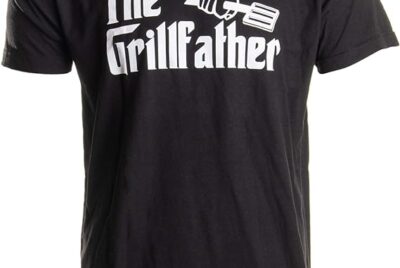Barbeque Sauces: The Most Important Part
Barbeque sauces are the heart and soul of any grilling session, adding a burst of flavor and a touch of zest to your favorite meats. Whether you’re a seasoned pit-master or a just a guy that cooks outside, understanding the different types of barbeque sauces can up your barbeque game to a whole new level. So, let’s dive into the saucy world of barbeque and discover what makes each variety unique.
Types of Barbeque Sauces
Barbeque sauces come in various types, each bringing its own distinctive taste and texture. Here’s a rundown of the most popular ones.
Tomato-Based Sauces- Tomato-based sauces are perhaps the most well-known, characterized by their sweet and tangy flavor. They’re often thick and sticky, perfect for slathering on ribs or chicken. The sweetness usually comes from brown sugar or molasses, balanced with a tang from vinegar.
Vinegar-Based Sauces- Vinegar-based sauces are more prevalent in the southeastern United States. These sauces are tangy and thin, often used as a marinade or basting sauce. They’re perfect for cutting through the richness of fatty meats like pork.
Mustard-Based Sauces- Mustard-based sauces are a staple in South Carolina. They have a tangy, sharp flavor that pairs wonderfully with pork. The base of these sauces is yellow mustard, giving them a unique taste and vibrant color.
Mayonnaise-Based Sauces- Mayonnaise-based sauces, often referred to as “white barbeque sauce,” hail from Alabama. These creamy sauces are a mix of mayonnaise, vinegar, and various seasonings. They’re ideal for chicken, adding a rich and tangy flavor profile.
Regional Variations in Barbeque Sauces
Barbeque sauces also vary significantly by region, with each area having its own signature style. Here are some of the most popular regional variations.
- Kansas City Style- Kansas City style is all about the sweet and smoky flavors. The sauce is thick, tomato-based, and loaded with molasses or brown sugar. It’s great for all types of meats, particularly ribs. Try this one!
- Memphis Style- Memphis style sauces are usually a bit thinner and tangier than Kansas City style. They often incorporate a balance of tomato and vinegar, making them versatile for different meats. Kind of a middle of the road kind of thing. MY FAVORITE SAUCE! They have it in smaller sizes too… but why bother!
- Texas Style- Texas style barbeque sauce is typically bold and spicy, with a tomato base and a kick of chili powder or hot sauce. It’s perfect for beef, especially brisket. The Original!
- Carolina Style- Carolina style sauces can vary, but they generally fall into two categories: mustard-based and vinegar-based. Both types are tangy and are particularly well-suited for pork. I’m a NORTH CAROLINA guy… so, try this one.
Choosing the Right Barbeque Sauce for Your Meat
Pairing the right barbeque sauce with your meat can make all the difference. Here are some tips for matching sauces with different types of meat- but frankly, I think it really comes down to what kind of sauce you like.
Pork- Pork pairs beautifully with a variety of sauces. Vinegar-based sauces cut through the richness, while mustard-based sauces complement the meat’s natural sweetness.
Beef- Beef, especially brisket, loves bold and spicy flavors. A Texas-style sauce (or rub) with a bit of heat works wonderfully. For something milder, a tomato-based sauce can also be excellent.
Chicken- Chicken is incredibly versatile and can handle a range of sauces. Tomato-based sauces are classic, but don’t shy away from trying a creamy, mayonnaise-based white sauce.
Seafood- Seafood benefits from lighter, tangier sauces. Vinegar-based or citrus-infused barbeque sauces can enhance the delicate flavors of fish and shellfish. Think Barbeque shrimp!
Homemade vs. Store-Bought Sauces
When it comes to barbeque sauces, you have the choice of making your own or buying from the store. Each option has its pros and cons.
Advantages of Homemade Sauces
Homemade sauces allow you to customize flavors to your liking. You control the ingredients, which means no preservatives or artificial flavors. Plus, there’s a certain pride in crafting your own sauce from scratch.
Advantages of Store-Bought Sauces
Store-bought sauces offer convenience and consistency. They save time and come in a variety of flavors, so you can easily find one that suits your taste. Additionally, they often have a longer shelf life. While they have preservatives (mostly to preserve- think, shelf life), don’t let it fool you… pictured above is one of the best sauces I have ever had. it also comes in a 128 oz. jug… which is how I buy it! That’s how I roll! Just the right mixture of sweet and vinegar!
How to Make Your Own Barbeque Sauce
Making your own barbeque sauce is easier than you might think. Here’s a basic recipe to get you started.
Basic Ingredients
You’ll need ketchup, vinegar, brown sugar, Worcestershire sauce (pronounce that WOOSTER), mustard, and a blend of spices like garlic powder, onion powder, and paprika.
Step-by-Step Guide
- Combine all the ingredients in a saucepan.
- Bring to a simmer over medium heat, stirring occasionally.
- Reduce the heat and let it simmer for 20 minutes, allowing the flavors to meld.
- Adjust the seasoning to taste, then let the sauce cool before using.
Tips for Using Barbeque Sauces
Here are some handy tips to get the most out of your barbeque sauces- for before, DURING and after the cook.
- Marinating- Marinating your meat in barbeque sauce before cooking can infuse it with flavor. Just remember to marinate for at least a few hours, or overnight for best results. Or, if you like, you can RUB!
- Basting- Basting with barbeque sauce during grilling keeps the meat moist and flavorful. Apply the sauce in the last 15 minutes of cooking to prevent it from burning.
- Dipping- Serve extra sauce on the side for dipping. It’s a great way to add an extra layer of flavor, especially for grilled meats and veggies.
Common Mistakes to Avoid
Avoid these common mistakes to ensure your barbeque sauce enhances your grilling experience.
- Applying sauce too early, which can cause it to burn.
- Using too much sauce, which can overpower the meat’s natural flavor.
- Not letting the sauce simmer long enough, which can lead to a raw taste.
Health Considerations
While barbeque sauces are delicious, it’s important to be mindful of their health aspects- So, if you are like me, and like to watch your girl-ish figure- listen up!
- Sugar Content- Many barbeque sauces are high in sugar, which can add extra calories. Look for low-sugar options or make your own to control the sweetness.
- Sodium Levels- Store-bought sauces can be high in sodium. If you’re watching your salt intake, check the labels or opt for homemade versions where you can adjust the salt content.
- Allergy Information- Always check the ingredients for potential allergens like soy, gluten, or nuts, especially if you’re serving a crowd. Homemade sauces can be tailored to avoid any allergens.
Barbeque sauces are a vital component of any grilling session, offering a range of flavors that can enhance any meat. Whether you prefer the convenience of store-bought sauces or the customization of homemade, there’s a barbeque sauce out there for everyone. So fire up the grill, get saucy, and enjoy the mouthwatering results!
FAQs
What is the best barbeque sauce for ribs?
The best sauce for ribs often depends on personal preference. However, Kansas City style, with its sweet and smoky flavor, is a popular choice.
Can I use barbeque sauce as a marinade?
Yup! Marinating meat in barbeque sauce can add a lot of flavor. Just make sure to marinate for several hours or overnight for the best results. I think that a vinegar based sauce works best for this.
How do I store homemade barbeque sauce?
Store homemade barbeque sauce in an airtight container in the refrigerator. It should last for about a week (a sauce with a lot of vinegar might last a little longer). For longer storage, consider freezing it in small portions.
